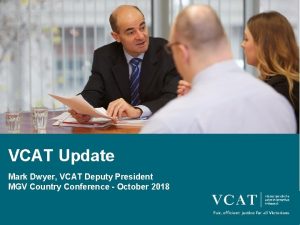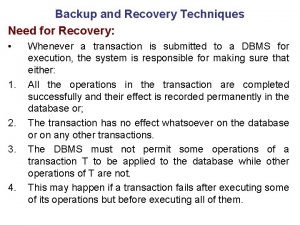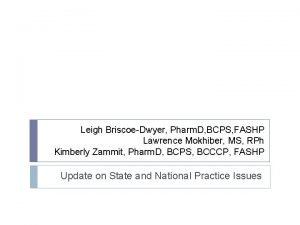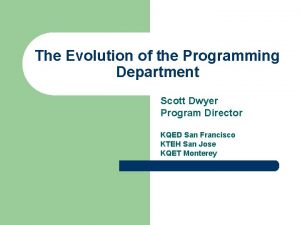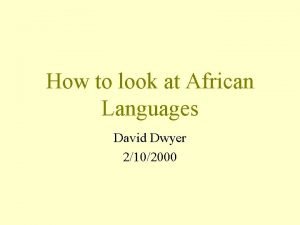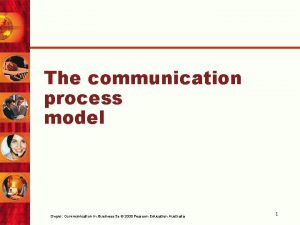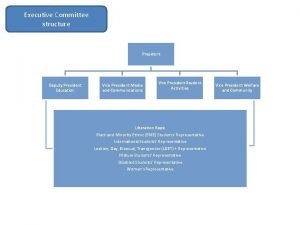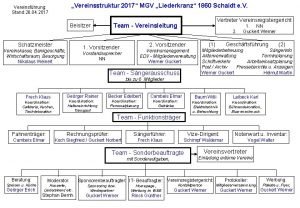VCAT Update Mark Dwyer VCAT Deputy President MGV









- Slides: 9

VCAT Update Mark Dwyer, VCAT Deputy President MGV Country Conference - October 2018

LV activity levels - 1 § Case numbers § 45 pending cases (35 rating/valuation, 3 LACA, 5 Local Govt, 2 other Acts) 2 VCAT Update 2018

LV activity levels - 2 § ‘Stakeholders’ in latest VLA/rating matters 3 VCAT Update 2018

LV activity levels - 3 § Timeliness – settlement rates still high > 70% (up from last year) – ‘average’ LV finalisation in 20 weeks (because of high settlements) – currently listing contested hearings for April/May 2019 – BUT timeliness still slipping for cases unresolved at CC • of the 45 pending matters, 8 > 1 yr (cf only 4 in 2017) • delay primarily by parties, not VCAT (and a few ‘test’ cases) 4 VCAT Update 2018

Recent Changes at VCAT § New President – Justice Michelle Quigley § Recent ‘new sessional member’ interviews for Planning and Environment List included valuers – watch this space! § LV Jurisdiction – LACA amendments in place (disputes under $400 k must come to VCAT, discretionary transfers between VCAT and court) – Local Govt Bill 2018 (changes to special rates and charges, transfer of County Court jurisdiction on rating to VCAT) 5 VCAT Update 2018

Digital Strategy in LV § Project ‘build’ now well advanced – soft launch in LV sub-list now likely in early 2019 – external stakeholder engagement (e. g. Maddocks, VGV etc) § Digital Strategy includes: – on-line application forms and fee payments – e-file and e-lodgement of documents – electronic communications between VCAT and parties – potential for digital exchange of information – business and process reform, rather than electronic replication of existing manual requirements 6 VCAT Update 2018

Current Issues - 1 Quality of statements of contentions – improving! – still some ‘tactical omissions’ with some parties not wanting to reveal all – still limited info in some cases where legal or methodology issues – remember a SOC from the valuation authority can be conditional/qualified – e. g. if inadequate RFI response Preparedness for compulsory conferences – some parties still failing to take CC seriously, or treating a failed CC as a ‘starting’ point to prepare the ‘real’ case Benefits/disbenefits of requiring an ‘alternative’ valuation based on the other party’s valuation approach 7 VCAT Update 2018

Current Issues - 2 § Expert Evidence – issues with quality & format of expert reports (cf PNVCAT 2) – need for facts and reasoned opinions, not advocacy. The primary duty of the expert is to the tribunal, not to a party. – care required in joint reports, in setting out what is agreed, what not agreed, and why not agreed – particularly the latter, including assumptions – preparation and readiness for hearing – concurrent evidence § Adoption of Queensland model? >>> 8 VCAT Update 2018

Current Issues - 3 § Queensland guidelines for expert evidence in valuation cases, 2018 • parties identify issues via SOC, and court nominates process • parties brief experts • if only one party nominates an expert on an issue, expert produces a statement of evidence • if both parties nominate an expert on an issue, those experts attend a meeting and produce a joint report. The experts may only produce a limited individual statement of evidence. • court may direct case to a court managed expert evidence (CMEE) process • if CMEE, a facilitator (member or registrar) will manage and supervise expert meetings, and can direct experts to respond to particular issues, questions etc, or to participate in mediation – including in absence of parties • focus on using experts to resolve issues, or to narrow and clearly articulate the issues for hearing • court decides how and when expert evidence given at a hearing 9 VCAT Update 2018
